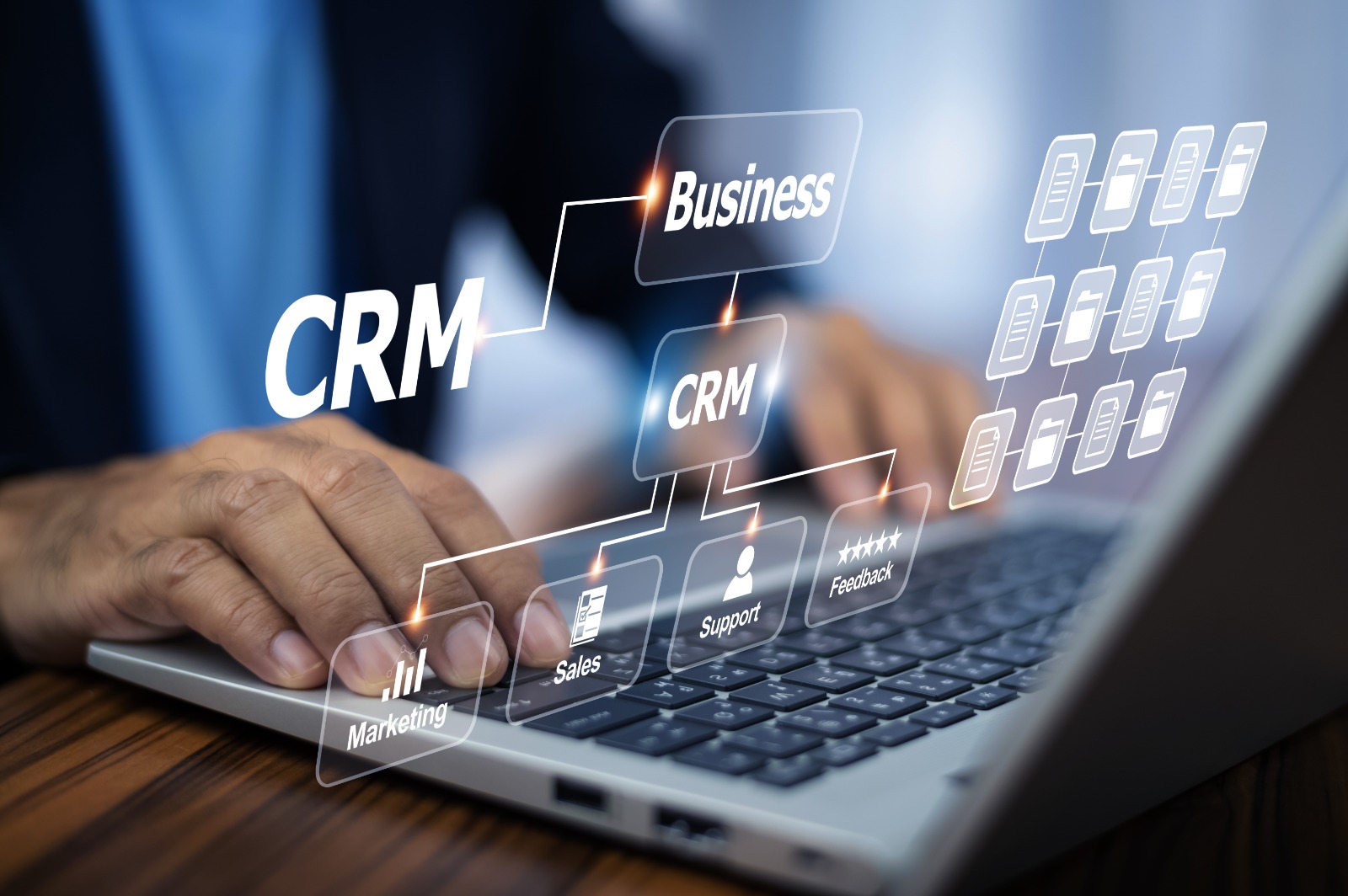Effective Communication Strategies with Customers Through CRM Systems
August 26, 2024

Effective Communication Strategies with Customers Through CRM Systems
In today’s fast-paced digital era, effective communication with customers is a key element for achieving sustainable success in businesses. This communication goes beyond merely providing good services or products; it’s about building strong and lasting relationships with customers. This is where Customer Relationship Management (CRM) comes into play. CRM tools are vital for companies looking to enhance their customer interactions and gain deeper insights into their needs. By implementing effective communication strategies supported by CRM services, businesses can boost customer satisfaction and loyalty, ultimately leading to sustainable growth.
What is Customer Relationship Management (CRM)?
Customer Relationship Management (CRM) is a comprehensive system that enables businesses to track and manage their interactions with potential and current customers. CRM acts as a bridge between companies and their customers, offering a set of tools to organize and analyze customer data, allowing businesses to deliver personalized services and interactions that better meet customer expectations.
Through CRM systems, businesses can collect data related to customer preferences, purchase history, and responses to marketing interactions. This in-depth analysis allows companies to understand customer behavior patterns and identify opportunities to continually improve the customer experience.
The Importance of Effective Communication with Customers
Effective communication with customers is not limited to sending emails or responding to inquiries; it involves creating a genuine and impactful interaction. This type of communication builds trust and enhances customer loyalty to the brand, contributing to higher retention rates and encouraging repeat purchases.
Effective communication contributes to:
- Building Trust: When customers feel that a company understands their needs and engages with them personally, trust in the brand increases.
- Increasing Customer Loyalty: Effective communication strengthens the customer’s connection to the brand, making them more likely to make repeat purchases and recommend the products or services to friends and family.
- Improving Company Reputation: Good communication reflects positively on the company and helps build its reputation in the market, attracting new customers.
Strategies for Effective Customer Communication
To enhance effective communication with customers, companies should implement well-planned strategies aimed at achieving genuine and impactful interactions. Here are some effective strategies:
- Personalization: Personalization is a key element of effective communication, as it helps provide a unique experience for each customer. By analyzing customer data available through CRM systems, companies can tailor messages and content to each customer based on their interests and past behavior. For example, personalized promotional offers based on a customer’s purchase history can increase the likelihood of engagement with the offer.
- Consistent Communication: Maintaining consistent communication with customers is another key to effective communication. Companies can use various channels such as email, text messages, and social media to regularly engage with customers. For instance, sending reminders about special offers or product updates keeps the brand at the top of the customer’s mind and reinforces their importance to the company.
- Active Listening: Effective communication requires companies to actively listen to their customers. There should be genuine interaction between the company and the customer, where feedback is heard and considered. CRM systems can play a pivotal role in gathering and analyzing this feedback, allowing companies to improve their products and services based on customer responses.
- Two-Way Communication: Effective communication should not be one-way. There should be opportunities for customers to interact with the company and share their opinions and expectations. This can be achieved by creating open communication channels such as surveys or responding to comments on social media. Two-way communication increases the customer’s sense of appreciation and enhances loyalty.
- Timely Communication: The timing of communication with customers is a critical factor. Prompt responses to customer inquiries or issues can increase satisfaction and boost loyalty. CRM systems can assist in prioritizing and ensuring timely responses, thereby improving the overall customer experience.
The Importance of Using CRM Systems in Customer Service:
- Pre-Sales Stage (Marketing and Lead Generation): At this stage, CRM systems aim to collect and analyze data about potential customers to identify needs and opportunities. Key functions in this stage include:
- Data Collection: CRM gathers data from various marketing channels such as websites, social media, and surveys.
- Lead Management: The system helps organize and track potential customers and their interactions with the company.
- Data Analysis: Used to analyze potential customer behavior and identify the most valuable target segments.
- Sales Stage (Managing Relationships During the Sales Process): This stage focuses on converting potential customers into actual customers. CRM relies on tools and automation to assist sales teams in making suitable offers and closing deals. Key functions include:
- Communication Management: Tracking sales communications with potential customers and recording contact details.
- Offer Personalization: CRM analyzes customer data to deliver appropriate offers based on their needs.
- Sales Team Coordination: Guiding sales teams on high-value opportunities and setting priorities.
- Post-Sales Stage (Customer Service and Support): After completing the sale, the focus shifts to providing support and follow-up to ensure customer satisfaction. CRM plays a significant role in this stage by:
- Managing Support Requests: The system records all customer support requests and forwards them to the relevant teams.
- Tracking Customer Complaints: The system monitors all customer complaints and issues to ensure they are resolved quickly and efficiently.
- Measuring Customer Satisfaction: Conducting surveys and evaluations to measure customer satisfaction and identify areas for improvement.
- Loyalty and Retention Stage (Ongoing Interaction): At this stage, CRM systems focus on building long-term relationships with customers, helping to enhance their loyalty to the company. This is achieved through:
- Ongoing Communication: Sending regular updates to customers via email or text about new products or offers.
- Loyalty Programs: Managing customer loyalty programs and encouraging continued engagement with the company.
- Identifying High-Needs Customers: Tracking purchasing behaviors to identify customers who require special attention to maintain their loyalty.
- Analysis and Reporting (Evaluation and Improvement): This stage involves analyzing data from previous stages to identify successes and shortcomings and improve company performance. CRM systems provide detailed reports on:
- Sales and Customer Service Performance: Offering insights into individual and team performance and measuring the effectiveness of efforts.
- Customer Satisfaction Rates: Providing reports on customer satisfaction levels and service weaknesses.
- Profitability Analysis: Measuring the return on investment from various activities and their impact on sales and loyalty.
About Arqam and Its Services for You
Arqam boasts extensive capabilities and over 8 years of experience in effective customer management and maintaining customer satisfaction through providing the latest communication and technology solutions sought by both large enterprises and emerging companies.
We also focus on training our team to be fully equipped with all the skills and advantages needed to perform their duties effectively, whether in call center services or other solutions offered by Arqam.
We take pride in our team of experts who excel in handling customer interactions and addressing their inquiries with the utmost efficiency.
Arqam’s solutions and technologies cover everything your organization needs, from services and products to professional follow-up to keep you informed about developments in real-time.
هل لديك اى استفسار؟
لا تتردد بالاتصال بنا نحن نعمل على مدار الساعة للاجابة عن استفسار لديك
- 920029985
- sales@arqaam.sa






